World Today Discussion Series
Series Highlights
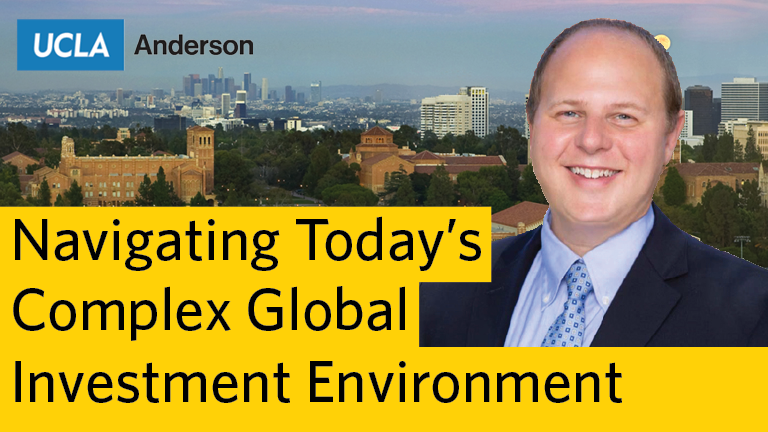
Managing a Large Multibillion-Dollar Global Portfolio and Navigating Today’s Complex Investment Environment: The Perspective of a Chief Investment Officer
January 24, 2024
In a post-pandemic world with greater macro and market volatility, several new challenges to investment are emerging. Amid technological change, shifting global production, geo-political fragmentation, ESG regulations, and conflicts around the globe, institutional investors and other private fund investors are rethinking asset allocation and considering the global economic exposure of their investments.
The Center for Global Management (CGM) hosted the inaugural discussion of 2024 in its World Today Discussion Series. Craig Ehrlich (B.A. ’78), who served as chair of the Center for Global Management for seven years, and is past chair of the UCLA Foundation, moderated a discussion with Justin Barton, president and chief investment officer of the UCLA Investment Company, responsible for the management of the UCLA Foundation’s ~$4 billion endowment fund - a global, multi-asset portfolio. Along with the UCLA Investment Company team, Barton oversees all aspects of the endowment including executing investment strategy, portfolio construction, and governance. Balancing the right number of relationships to create a global, multi-asset class portfolio that is not overly diversified is a persistent challenge in normal times. Barton described the role of the UCLA Investment Company and explained how investment models and strategies have evolved over the years, and since the pandemic. He addressed the key issues currently facing institutional investors and the challenges with navigating the increasingly complex investment environment with greater uncertainty and dispersion of returns. Barton also identified some of the elements that make for successful long-term investment partnerships as investment management companies face new threats and uncommon opportunities; and shared his observations on how investment models and strategies will need to continue to evolve and be reflective of a more active and dynamic approach to managing investment portfolios. The discussion followed on from a conservation between Ehrlich and Barton, as part of the CGM Special COVID-19 World Today Discussion Series, back in April 2020, at the beginning of the pandemic. At that time, they discussed the key issues faced by institutional investors amid COVID-19 volatility, as they and other private fund investors were considering the economic exposure to their investments from operational disruptions as a result of the pandemic.
Current students from across Anderson’s MBA, MFE and Ph.D. programs attended the evening that began with a networking reception and concluded with a networking dinner. The discussion was also broadcast live and attended by UCLA Anderson alumni around the world, current students and members of the broader UCLA and general communities. The CGM’s World Today Discussion Series engages the audience in interactive and enriching conversations around current issues that transcend borders. UCLA and Anderson faculty, alumni, board members and thought leaders share their perspectives on the critical global topics and issues that matter to our community and the world. Through balanced discourse, the serves as a neutral forum to educate the community on global issues, while at the same time encouraging debate and examination.
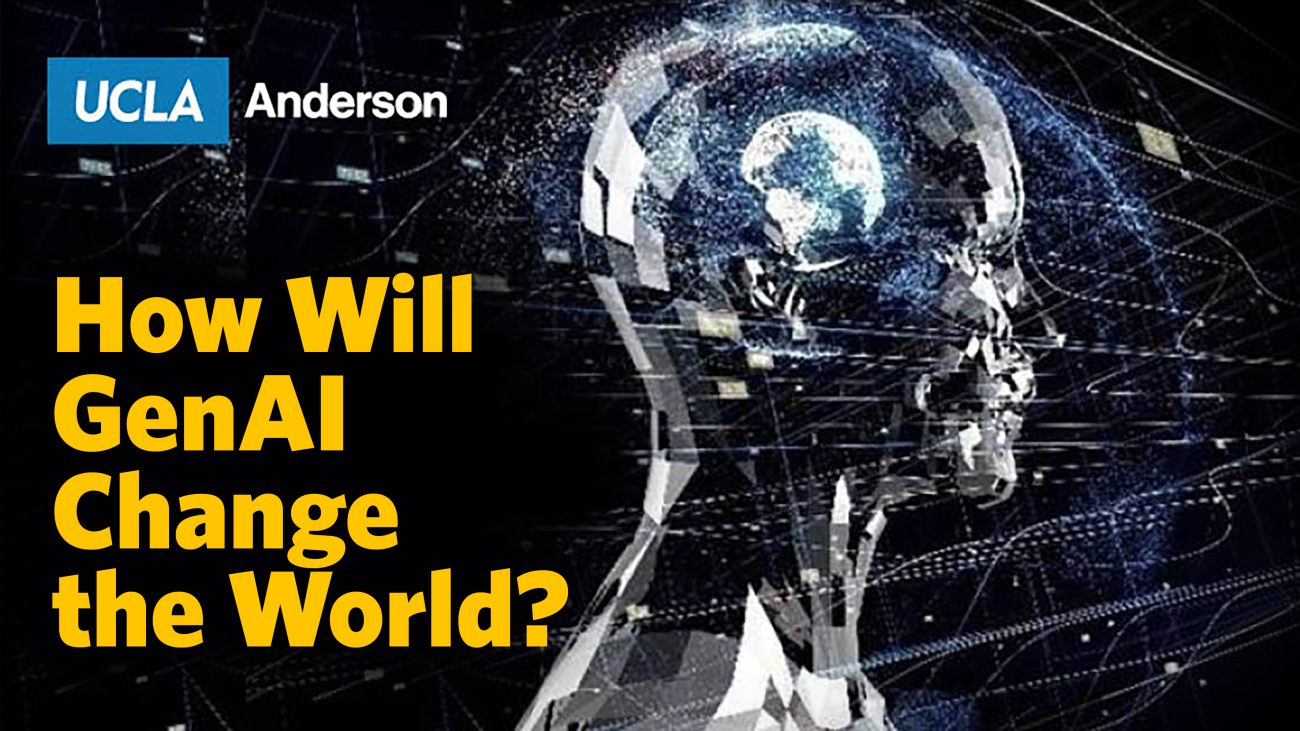
How Generative AI Will Change Products, Services, Industries and Society Around the World
October 19, 2023
Since the launch of OpenAI’s ChatGPT in late 2022, generative AI (GenAI) technology has been advancing at a rapid pace. Gen AI has the potential to influence and add enormous value across the global economy, generating productivity and augmenting imagination. Its impact to consumers, business, industries and society could be profound. Managing the challenges and opportunities associated with gen AI will be important: the human element, the evolving regulatory environment and how to harness AI in a trusted manner, as well understanding the implications for the workforce and future of work and considerations for businesses and society.
The Center for Global Management (CGM) hosted its inaugural discussion of the new academic year in its World Today Discussion Series, in partnership with the Easton Technology Management Center. As the world grapples to understand the technology’s power, reach, and capabilities, students from across all of Anderson’s degree programs joined the evening to listen and learn from the faculty directors of the two centers, Chris Tang and Terry Kramer. They addressed the latest developments and emerging trends in GenAI and provided use cases to demonstrate the impact of data and AI on traditional industries, creating enhanced outcomes, new product/service offerings and changing competitive positioning and the increasing relevance of public policy issues. Kramer also provided suggestions on what students and alumni can do in the presence of a rapidly changing AI landscape and shared examples of the skills and resources necessary for businesses to effectively leverage GenAI as well as thought on how we can prepare ourselves for the exponential growth of AI tools. The conversation also assessed the leadership imperative to the effective use of AI/data to create winning outcomes to benefit business and consumers while seeking to understand competitive risks and societal impact.
Current students from across all Anderson’s MBA, MSBA, MFE and Ph.D. programs attended the evening that began with a networking reception and concluded with a networking dinner. The discussion was also broadcast live and attended by many UCLA Anderson alumni around the world, current students and members of the broader UCLA and general communities. The CGM’s World Today Discussion Series engages the audience in interactive and enriching conversations around current issues that transcend borders. UCLA and Anderson faculty, alumni, board members and thought leaders share their perspectives on the critical global topics and issues that matter to our community and the world. Through balanced discourse, the serves as a neutral forum to educate the community on global issues, while at the same time encouraging debate and examination.
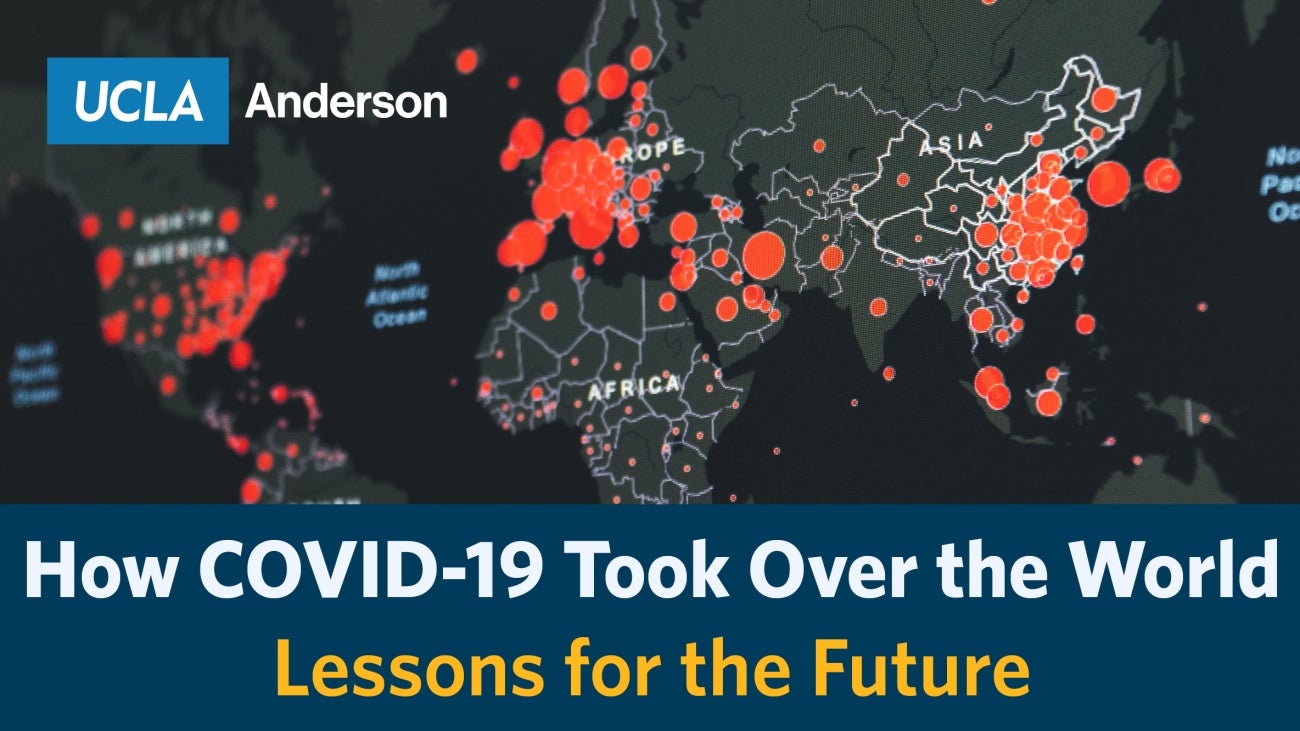
How COVID-19 Took Over the World: Lessons for the Future - A Discussion with Policy and Supply Chain Experts, Christine Loh and Professor Chris Tang, and Economist Michael Edesess
May 9, 2023
COVID-19’s place in history is assured as the first pandemic to emerge in the twenty-first century. The pandemic left disorder and crises in its wake everywhere it struck. Drawing on disciplines including public health, politics, and socioeconomics, in her recent edited book How COVID-19 Took Over The Word: Lessons for the Future, Center for Global Management visiting scholar and policy expert Christine Loh, tracks the spread of COVID-19 to weave a coherent picture that explains how scientists learnt about the virus, how authorities reacted around the world, and how different societies coped. Written by a leading team of public health, policy, and economics experts, with contributions by global supply chain expert and CGM faculty director, Professor Chris Tang, and Hong Kong-based economist Michael Edesess, the book provides an in-depth analysis of various countries’ responses to the onset of the pandemic, as well as suggestions to increase capacity and capability to fight future pandemics. The Center for Global Management (CGM) hosted a moderated discussion with Professor Chris Tang and Michael Edesess. During the hour-long conversation, moderated by Christine Loh, Tang and Edesess provided insights and perspectives on this complex subject and the many global issues that emerged. They provided an overview of global governance and international cooperation; discussed economic and social consequences of the outbreak; highlighted the supply chain challenges that surfaced; and examined and compared specific countries responses. They also shared their observations on lessons learned.
The conversation was part of the CGM’s World Today Discussion Series which engages the audience in interactive and enriching conversations around current issues that transcend borders. UCLA and Anderson faculty, alumni, board members and thought leaders share their perspectives on the critical global topics and issues that matter to our community and the world. Through balanced discourse, the series serves as a neutral forum to educate the community on global issues, while at the same time encouraging debate and examination.
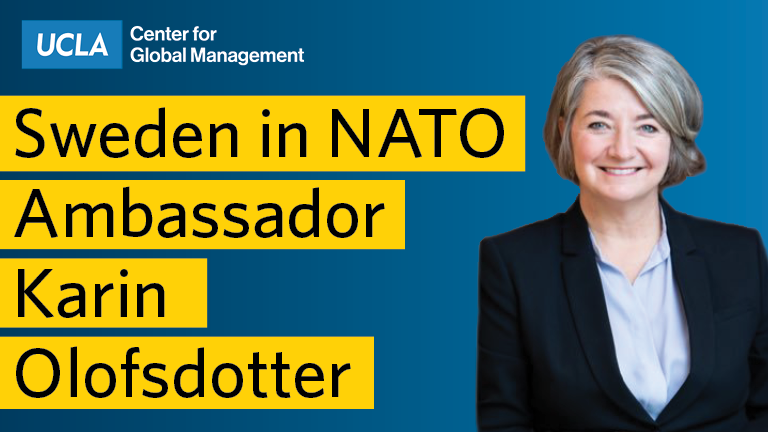
International Relations and Joining NATO: Sweden’s Foreign Policy and Domestic Accomplishments with Environmental Issues and Gender Equality with Karin Olofsdotter, Sweden’s Ambassador to the U.S.
October 6, 2022
Sweden is known for its high quality of life measures and standard of living with relatively equal distribution of wealth. More than half of Sweden’s national energy supply comes from renewables and in 2021, Sweden ranked second in the UN Sustainable Development Report. Sweden has also long been a strong promoter of gender equality, ranking first in the EU on the Gender Equality Index. However, the war in Ukraine is driving economic slowdown in the Nordics as energy shortages accelerate and inflation continues upward – heightening macroeconomic risks for the country.
The Center for Global Management (CGM) hosted Her Excellency Karin Olofsdotter, Ambassador of Sweden to the United States, for a presentation and moderated conversation with Professor Chris Tang, faculty director of the CGM. Ambassador Olofsdotter addressed current global issues, Sweden’s role in the EU and its decision to join NATO. She shared her observations on social and leadership issues, and environmental challenges of the future. She discussed how Sweden is making big strides towards safeguarding the future as well as conserving the past and addressed its ambitious goals for sustainability and gender equality. Ambassador Olofsdotter was joined by Okko-Pekka Salmimies, Consul General of Finland in Los Angeles who shared more about his own country’s decision to join NATO. UCLA students, faculty and staff gathered in the executive dining room for the conversation while others joined remotely via Zoom. Ambassador Olofsdotter is an accomplished diplomat. Her career in the Foreign Service started in 1994 with her first posting to the Embassy of Sweden in Moscow. In the years following, she worked in security policy and defense issues as well as in numerous leadership posts within the Ministry for Foreign Affairs, including serving as Chief of Staff for several of its Ministers and Director of the Ministers’ Office. She has also served as part of the Swedish delegation to NATO and at the Swedish EU Representation in Brussels, working with European security policy and defense issues. Prior to assuming the role as Ambassador to the United States, she served as Director-General for Trade at the Swedish Ministry for Foreign Affairs. She has also held the position of Deputy Director-General and Head of the Department for Promotion of Sweden, Trade, and CSR at the Foreign Ministry. UCLA Anderson Dean Tony Bernardo provided opening remarks. The discussion was also co-sponsored by UCLA Anderson’s European Business Association and Women’s Business Connection The conversation was part of the CGM’s World Today Discussion Series that engages the audience in interactive and enriching conversations around current issues that transcend borders. UCLA and Anderson faculty, alumni, board members and thought leaders share their perspectives on the critical global topics and issues that matter to our community and the world. Through balanced discourse, the serves as a neutral forum to educate the community on global issues, while at the same time encouraging debate and examination.
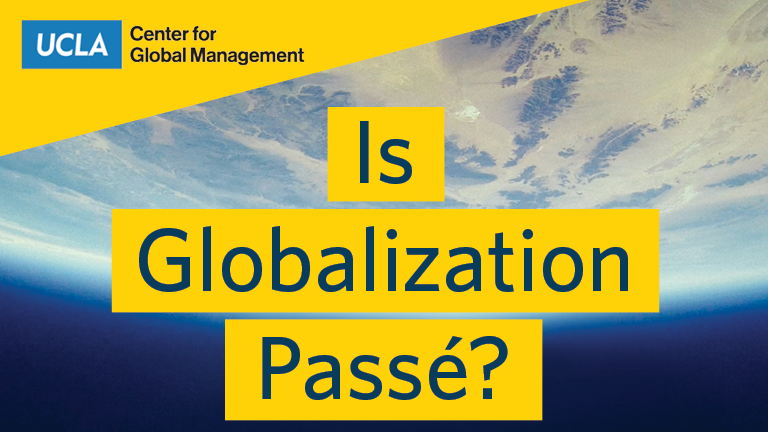
Is Globalization Passe? A Discussion with Jim Moffatt (’87), Former Global CEO and Vice Chairman, Deloitte Consulting
October 5, 2022
As the global economy was beginning to recover from the COVID-19 pandemic, Russia invaded the Ukraine and has been sanctioned from the West; relations between China and the U.S. have been deteriorating; and supply-chain shocks have roiled markets for food, energy and other commodities. Discussions on reshoring are on the minds of many business and political leaders. Is globalization over or is it merely changing shape?
The Center for Global Management (CGM) hosted its inaugural event of the new academic year focused on the question Is Globalization Passé? Global strategy expert Jim Moffatt (’87), former global CEO and vice chairman of Deloitte Consulting joined CGM faculty director, Chris Tang, distinguished professor and Edward W. Carter Chair in Business Administration, and Moffat’s former professor, in a moderated discussion around the question. Moffatt addressed the major challenges firms face during this unsettling period and explored the implications of both sides of the debate. Is globalization as the world has experienced over the last three decades dead, as Blackrock’s Larry Fink suggested in a letter to shareholders earlier this year? Or, is globalization still alive and simply evolving into a new kind of globalization that is more about security than efficiency that could change the world economy for the better, keeping the benefits of openness while improving resilience? The conversation focused on many issues, including the future of trade, supply chains, the energy crisis and global investment, and touched on many regions, including Europe, Asia and Latin America. Moffat shared his thoughts on areas with growth potential and how growth can be achieved. He also addressed the importance of a global management education at UCLA Anderson and reiterated how essential it is for organizations and leaders alike to have a global mindset. The conversation was part of the CGM’s World Today Discussion Series and the Global Management Speaker Series, supported by the Class of 2022. The CGM welcomed many members of the Class of 2022 back to their alma mater for an evening of discussion, networking and reconnecting. Current students from across all four MBA programs attended the evening that began with a networking reception and concluded with a networking dinner. The discussion was also broadcast live and attended by many UCLA Anderson alumni, current students and members of the broader UCLA and general communities. The World Today Discussion Series engages the audience in interactive and enriching conversations around current issues that transcend borders. UCLA and Anderson faculty, alumni, board members and thought leaders share their perspectives on the critical global topics and issues that matter to our community and the world. Through balanced discourse, the serves as a neutral forum to educate the community on global issues, while at the same time encouraging debate and examination.
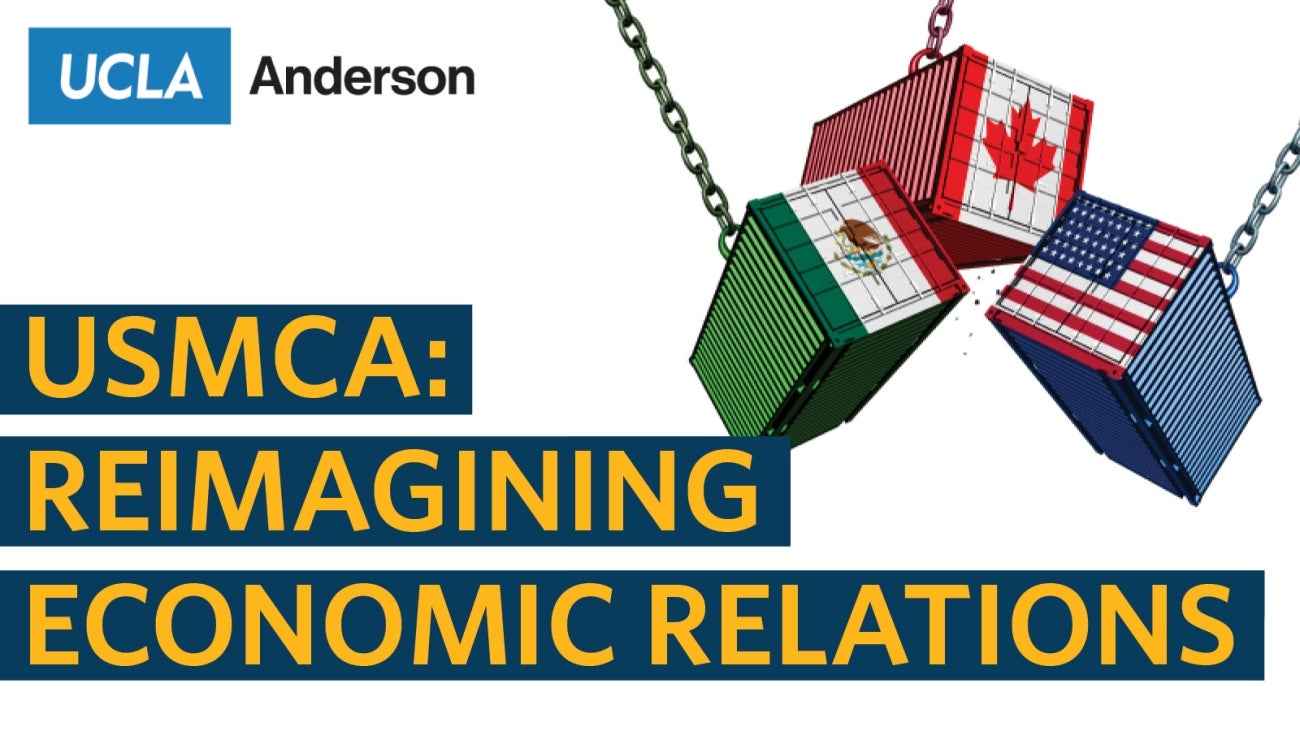
USMCA and Its Potential to Help the U.S. Improve Supply Chain Resiliency
March 9, 2022
The United States-Mexico-Canada Agreement (USMCA) which builds on the North American Free Trade Agreement (NAFTA) largely retains NAFTA’s commitment to lowering trade barriers and accomplishes extensive modernization and innovation (although it rolls back trade openness in the auto sector). USMCA presents an opportunity for the three countries to “build back better,” reduce North America’s economic reliance on China and leverage the region’s collective talents, capital, and expertise to develop a more competitive, sustainable, and inclusive North American economy. The importance of USMCA is amplified by growing geopolitical competition with China and the COVID-19 pandemic which has underscored the need to expand and strengthen resilient supply chains by reshoring activities within North America. However, protectionist policies of the three countries could hinder economic development and supply-chain resiliency in the region. Will USMCA truly help the United States “build back better,” and provide a sustainable framework for the region to work as key partners on important and forward-looking issues.
The Center for Global Management (CGM), in collaboration with the UCLA Ziman Center for Real Estate hosted a discussion with experts in international trade, logistics, infrastructure and supply chain. World renowned economist and scholar on global trade, Professor Sebastian Edwards joined Lyman Daniels, president of the Mexico operations for CBRE, the global leader in commercial real estate services and investment and Patrick Ottensmeyer, president of Kansas City Southern, a transportation holding company with railroad investments in the U.S. and Mexico. The discussion was moderated by CGM faculty director, Chris Tang, distinguished professor and Edward W. Carter Chair in Business Administration. Panelists shed light on the challenges and opportunities of USMCA and addressed whether USMCA has the potential to reimagine North American economic relations, increase trade flows, build a more competitive, sustainable, and inclusive regional economy and ensure supply-chain responsiveness and resiliency in the long-term. The discussion was part of the CGM’s World Today Discussion Series. This series engages the audience in interactive and enriching conversations around current issues that transcend borders. UCLA and Anderson faculty, alumni, board members and thought leaders share their perspectives on the critical global topics and issues that matter to our community and the world. Through balanced discourse, the series serves as a neutral forum to educate the community on global issues, while at the same time encouraging debate and examination.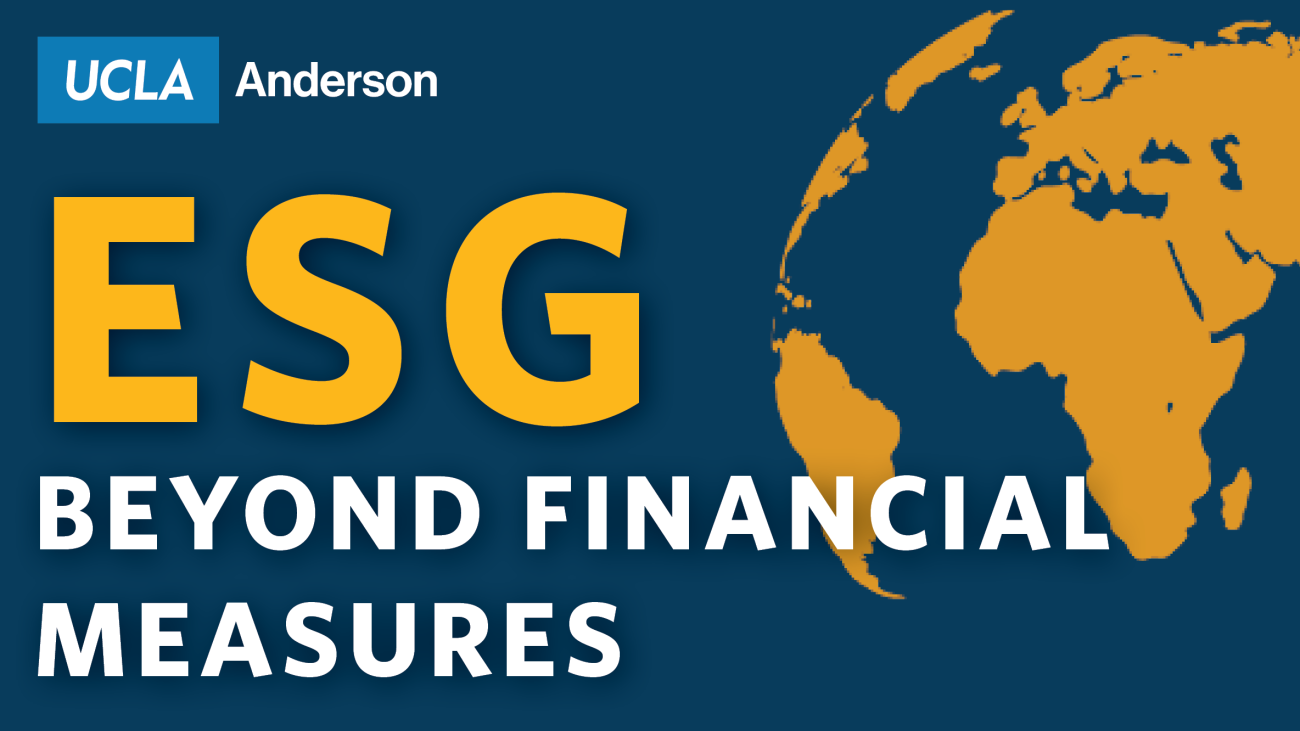
ESG: Going Beyond Financial Measures to A More Environmentally Sustainable and Socially Responsible Future
February 24, 2022
Since its debut in a United Nations report in 2006, ESG—the acronym for environmental, social, and governance issues—has captivated the attention of businesses, governments, and academics. Today, ESG is the most widely accepted measure of firms’ sustainability and social impact. The ESG movement is creating a new incentive for companies to collect and disclose information about financial, environmental sustainability, and social responsibility performance and is forcing CEOs to construct measurable means to describe and present their businesses. In less than two decades, ESG investing has evolved into a US$35 trillion industry. While it is gathering momentum around the globe, companies and stakeholders have struggled with the myriad of complex and inconsistent sustainability standards, frameworks and metrics. Given the recent announcement at COP26 of the creation of an International Sustainability Standards Board (ISSB) that will provide the foundation for consistent and global – environmental, social and governance reporting standards, are companies more likely to pivot their operations to a more environmentally sustainable and socially responsible future?
The Center for Global Management (CGM), in collaboration with the Center for Impact hosted a discussion around these issues with internationally renowned experts in environmental issues and ESG. Professors Christine Loh, undersecretary for the environment, Hong Kong SAR Government (2012-17) and chief development strategist, Institute for the Environment, HKUST joined Magali Delmas, director of the UCLA Center for Corporate Environmental Performance and Center for Impact@Anderson and explained why the ESG movement, unlike the lack luster CSR initiative, is motivating action by corporations. They explored key challenges and opportunities for practitioners and researchers in ESG and explained why in the wake of climate change, social injustice and income inequality, corporations need to change the way they operate and go beyond the traditional financial measures by taking various ESG measurements into consideration. The discussion was moderated by CGM faculty director, Chris Tang, distinguished professor and Edward W. Carter Chair in Business Administration. The discussion was part of the CGM’s World Today Discussion Series. This series engages the audience in interactive and enriching conversations around current issues that transcend borders. UCLA and Anderson faculty, alumni, board members and thought leaders share their perspectives on the critical global topics and issues that matter to our community and the world. Through balanced discourse, the series serves as a neutral forum to educate the community on global issues, while at the same time encouraging debate and examination.
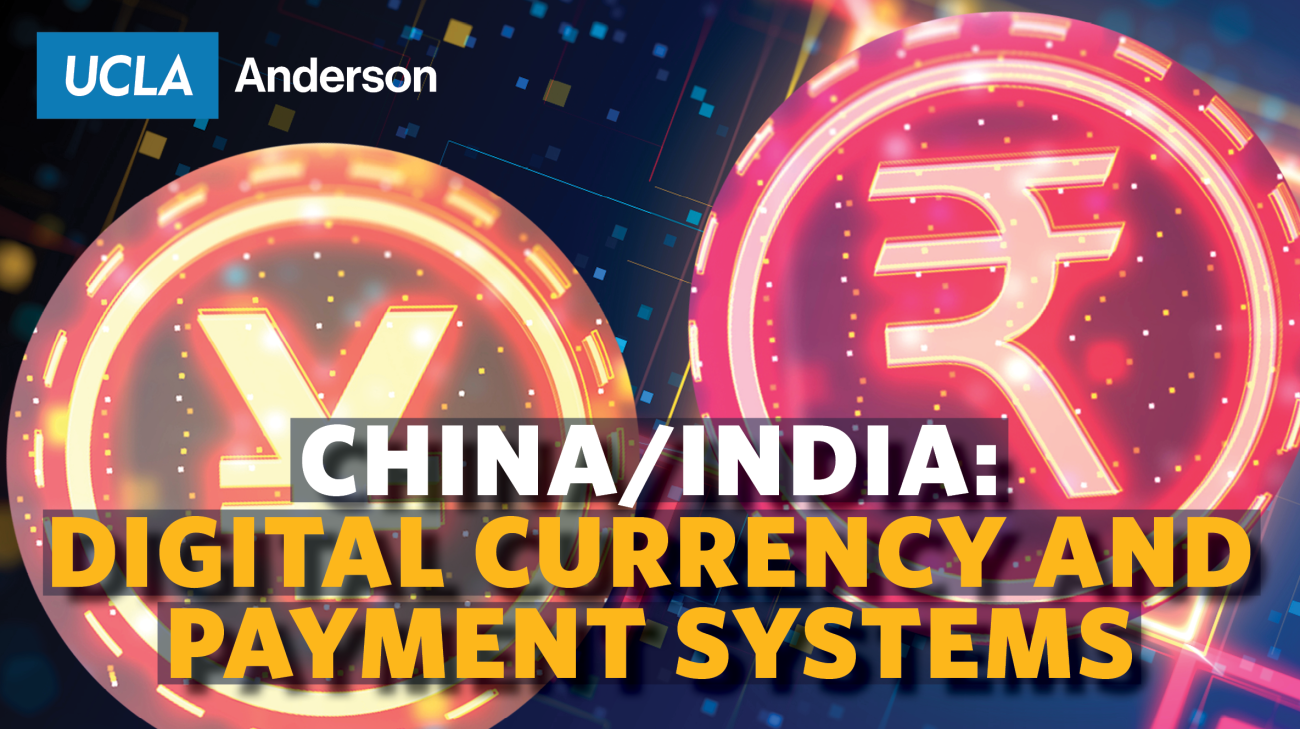
China’s Digital Currency and India’s Digital Payment Systems: Implications for Asia and the World
October 5, 2021
China began piloting the world's first digital sovereign currency in April. China's digital renminbi, backed by its central bank, has the potential to not only displace unregulated cryptocurrencies, but also to internationalize the renminbi. Meanwhile India, amid the gloom of the pandemic and efforts to promote its own digital journey, overtook China to register the highest number of countrywide digital payments. The world’s largest digital and financial inclusion program of its kind has helped transform the lives of millions of Indians. This digital payment (Paytm) boom is indicative of a larger paradigm shift in the ease of access to financial services. Much of this success is a result of the diligent policy and technology frameworks created by the central government over the last few years.
The Center for Global Management (CGM) hosted a discussion around these two major technological developments that received limited coverage in the U.S. media, but their potential impacts are far-reaching. Michael Sung, chairman, CarbonBlue Innovations, a leading venture building and investment company focused on blockchain, fintech and digital finance innovation, and leading researcher in the area of digital currencies joined Bhagwan Chowdhry, professor of finance, Indian School of Business and director of its Digital Identity Research Initiative. The fascinating conversation which drew a global audience of students, alumni, faculty, staff, and members of the extended UCLA community and general public, was moderated by CGM faculty director, Chris Tang, distinguished professor and Edward W. Carter Chair in Business Administration. During the hour-long conversation, Chowdhry and Sung reviewed these technological developments; explored the impact and implications for China, India, the U.S. and the world; examined opportunities for startups, venture investors and the global investment community; and shared their longer-term views on the future of digital payments and digital currencies. The discussion was part of the CGM’s World Today Discussion Series and was co-sponsored by UCLA Anderson’s Greater China Business Association and South Asian Business Association. The World Today Discussion Series engages the audience in interactive and enriching conversations around current issues that transcend borders. UCLA and Anderson faculty, alumni, board members and thought leaders share their perspectives on the critical global topics and issues that matter to our community and the world. Through balanced discourse, the serves as a neutral forum to educate the community on global issues, while at the same time encouraging debate and examination.
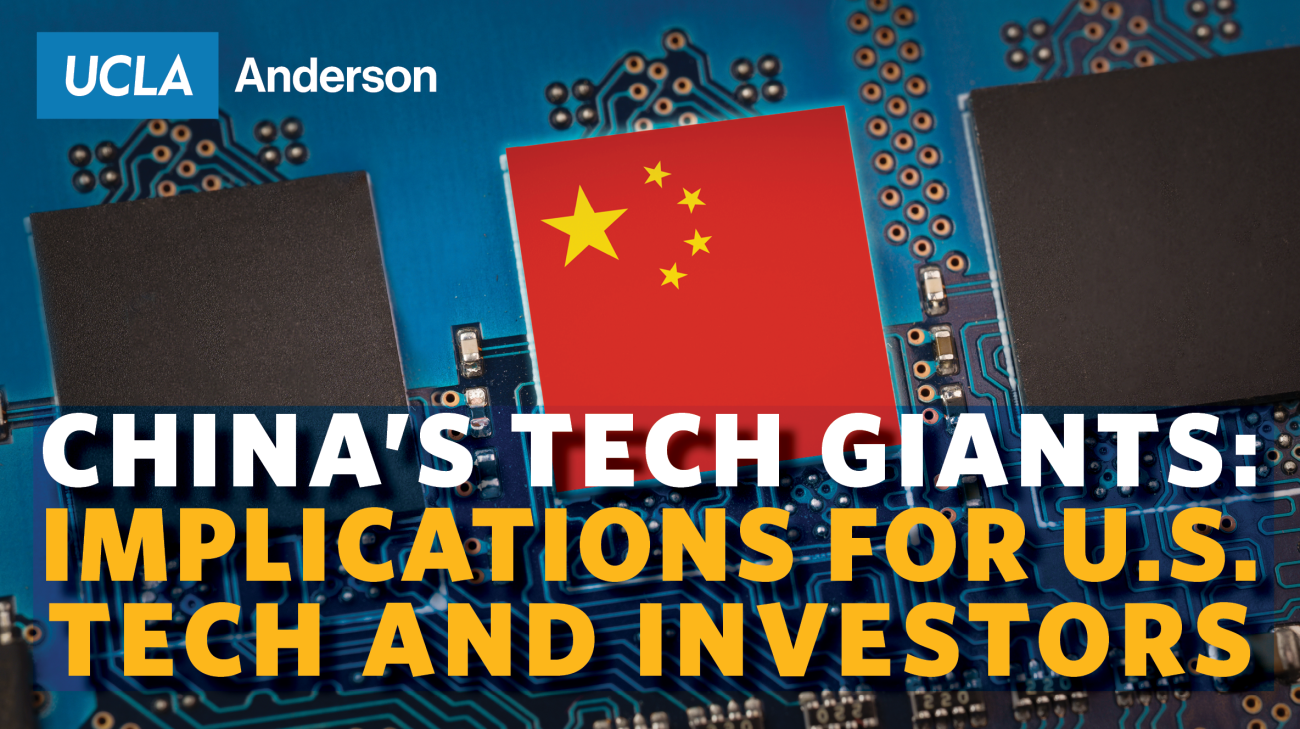
China’s Tech Giants: Recent Events and Implications for U.S. Investors and Tech Firms
September 30, 2021
Earlier this year, as China unveiled its 5-year plan with tech ambitions at its core, the world took notice of the phenomenal success of some of China’s biggest names in tech which have become central to everyday life in China, including e-commerce platform Alibaba, internet-based platform Tencent and ride-hailing app DiDi. For the past several years, foreign investors have been pouring money into their stocks. But this summer, their shares, listed in New York and Hong Kong saw sharp selloffs that had little to do with the companies’ business performance. China has taken a series of actions to reign in big tech, sending shock waves through international markets, stocks plummeting, and causing massive selloffs and shutdowns of multi-billion dollar IPOs. Until recently, Chinese companies going public in the U.S. were a bright spot in the otherwise tumultuous U.S.-China relationship. But now everyone is watching to see what steps Chinese regulators will take next and investors wonder what the future holds for China’s tech companies and more broadly for listings of Chinese companies in the U.S. and other countries.
The Center for Global Management (CGM) hosted a moderated panel discussion with China expert Gordon Orr, who spent over 30 years with McKinsey in China and sits on the boards of a number of Chinese tech companies; Ken Sansom (’06), global director, emerging tech at Amazon Web Services with over 30 years leading technology businesses across the U.S., Asia, and Europe; and Harvard Business School Professor Feng Zhu, a research expert on Chinese tech firms such as DiDi and Alibaba. Panelists reviewed recent events and explored the possible impact on private and foreign investments and broader implications from a business, legal and U.S.-China relations perspective. They also discussed implications for U.S. investors and shared lessons learned for U.S. tech giants. The global audience of students, alumni, faculty, staff, and members of the extended UCLA community and general public asked many important questions during the audience Q&A that went into a deeper discussion on the transition of the tech sector and some of the key topics and longer-term implications. The conversation, moderated by Chris Tang, distinguished professor and Edward W. Carter Chair in Business Administration, was part of the CGM’s World Today Discussion Series and was co-sponsored by the UCLA Anderson Easton Technology Management Center and Greater China Business Association. The World Today Discussion Series engages the audience in interactive and enriching conversations around current issues that transcend borders. UCLA and Anderson faculty, alumni, board members and thought leaders share their perspectives on the critical global topics and issues that matter to our community and the world. Through balanced discourse, the serves as a neutral forum to educate the community on global issues, while at the same time encouraging debate and examination.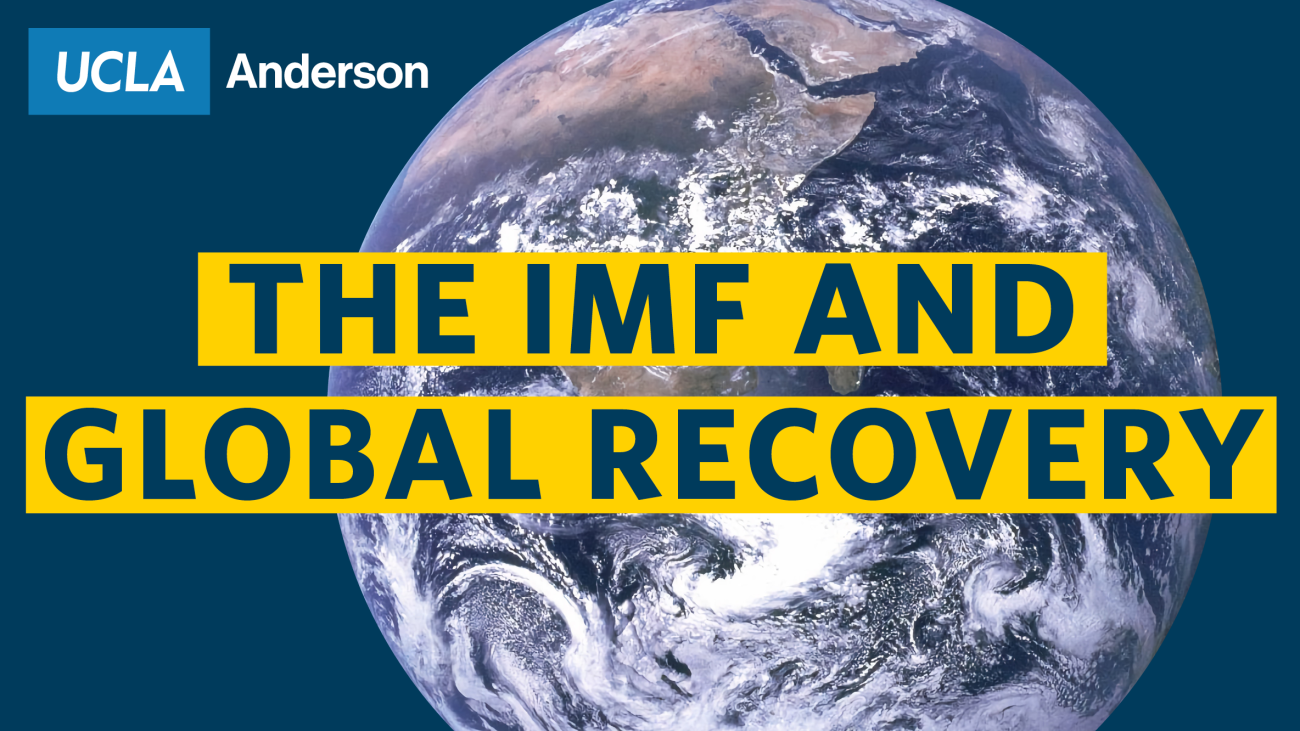
The International Monetary Fund (IMF): Protecting the Global Economy and Propelling a Sustainable Recovery
May 5, 2021
The COVID-19 pandemic has caused an unprecedented public health, economic, and social crisis, threatening the lives and livelihoods of millions. The economic shock is increasing poverty, worsening inequalities, and reversing development gains. Economic recoveries are diverging across countries and sectors, reflecting variation in pandemic-induced disruptions and the extent of policy support. Emerging market economies and low-income developing countries face rising public debt levels, are more vulnerable to financial stress and expected to suffer more significant medium-term losses. While a vibrant private sector will be essential for countries to recover, create jobs, and embrace economic transformation, strong coordination across bilateral and multilateral organizations such as the International Monetary Fund (IMF) and World Bank will play a crucial role to contain the impacts of the pandemic and build up the foundation of strong international cooperation for a green, smart and inclusive recovery.
The Center for Global Management hosted a moderated conversation with UCLA Anderson alumnus, Richard Farber (’88), who recently completed his term as alternate executive director at the IMF. In this position, he represented the United States on the IMF’s executive board, ensuring the stability of the international monetary system and providing financial assistance to members focusing on low-income, fragile, conflict-affected states, and emerging markets. Farber addressed the history, role and purpose of the IMF, the world’s crisis lender, the diverging impact of COVID-19 on member countries and explained how the IMF continues to support countries on the path to recovery by providing policy advice, financial support, capacity development, and debt relief for the poorest. He also explored how the IMF is enhancing its support to member countries as they pursue their Sustainable Development Goals. The global audience of students, alumni, faculty, staff, and members of the extended UCLA community and general public asked many important questions during the audience Q&A that went into a deeper discussion on some of the key topics raised where Farber touched on digital currencies and the role of the IMF in addressing climate change. The discussion, moderated by Sebastian Edwards, distinguished professor and Henry Ford II Chair in International Management, was part of the CGM’s World Today Discussion Series and was co-sponsored by the UCLA Anderson Laurence & Lori Fink Center for Finance and UCLA Burkle Center for International Relations. The World Today Discussion Series engages students in dialogue in an interactive, engaging and enriching discussion format around current global issues that transcend borders. Through the series, the CGM engages globally minded students with issues that matter and ideas that stimulate. Through balanced discourse, the series serves as a neutral forum to educate students on global issues while at the same time encourage debate and examination. UCLA Anderson’s Center for Global Management is committed to providing timely and relevant information about critical global topics and issues that matter to our community and the world.
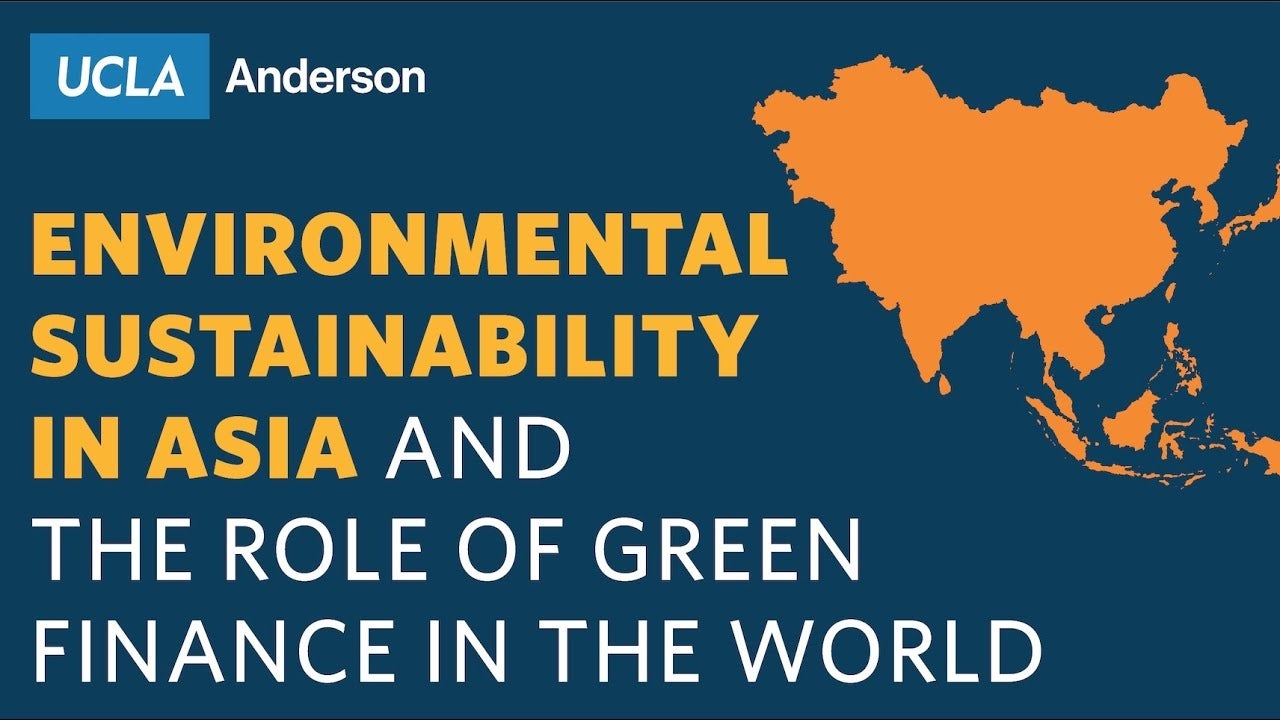
Environmental Sustainability in Asia and the Role of Green Finance in the World
February 4, 2021
China’s announcement of its pledge to achieve carbon neutrality by 2060 (and subsequent announcements by Japan and South Korea) could help significantly slow global warming. In recent years, China has emerged as a leader in clean energy technologies, including solar panels and wind turbines. It is also the world’s largest manufacturer of electric cars and buses. Green bonds and other types of sustainable financing could play a major role in driving China’s pledge to be carbon-neutral within the next four decades, as sustainable investing gains more traction in investment portfolios. The U.N.’s Environment team is already working with public and private sector organizations in an attempt to align international financial systems to its sustainable development agenda. At a national level, too, central banks are making noises about prioritizing greener investment. The U.S. incoming administration has made clear that climate change will be one of its priorities. How will different types of economies and political systems East and West cope with a problem so large? If governments fail to properly price the costs of carbon related pollution, what responsibilities do private companies have? How should the conflict between shareholders and other stakeholders be managed?
The Center for Global Management hosted a moderated conversation to address these important issues. Ivo Welch, distinguished professor and J. Fred Weston Chair in Finance and a highly respected authority on socially responsible investing joined Christine Loh, visiting professor, former deputy minister for the environment in the Hong Kong SAR Government and a subject expert and strategist on the environment, who advises HSBC, BASF and others. The discussion was moderated by Sebastian Edwards, distinguished professor and Henry Ford II Chair in International Management. Loh and Welch analyzed the new definition of sustainability after COVID-19 and how the disruption will likely impact the future sustainability policies in the U.S., Asia and the world. They examined the tradeoffs associated with the future provision of energy necessary to support modern economies and shared their longer-term views on the role of green financing to address the central issue of our time - the impact of fossil fuel related emissions on human economic activity and wellbeing. The global audience of students, alumni, faculty, staff, and members of the extended UCLA community and general public asked many important questions during the audience Q&A that went into a deeper discussion on some of the key topics raised and touched on ESG, cap and trade as well as nuclear energy and rising sea levels. The discussion which was part of the CGM’s World Today Discussion Series was co-sponsored by the UCLA School of Law’s Emmett Institute on Climate Change and the Environment and Lowell Milken Institute for Business Law and Policy, as well as the UCLA Anderson Fink Center for Finance. The World Today Discussion Series engages students in dialogue in an interactive, engaging and enriching discussion format around current global issues that transcend borders. Through the series, the CGM engages globally minded students with issues that matter and ideas that stimulate. Through balanced discourse, the series serves as a neutral forum to educate students on global issues while at the same time encourage debate and examination. UCLA Anderson’s Center for Global Management is committed to providing timely and relevant information about critical global topics and issues that matter to our community and the world.
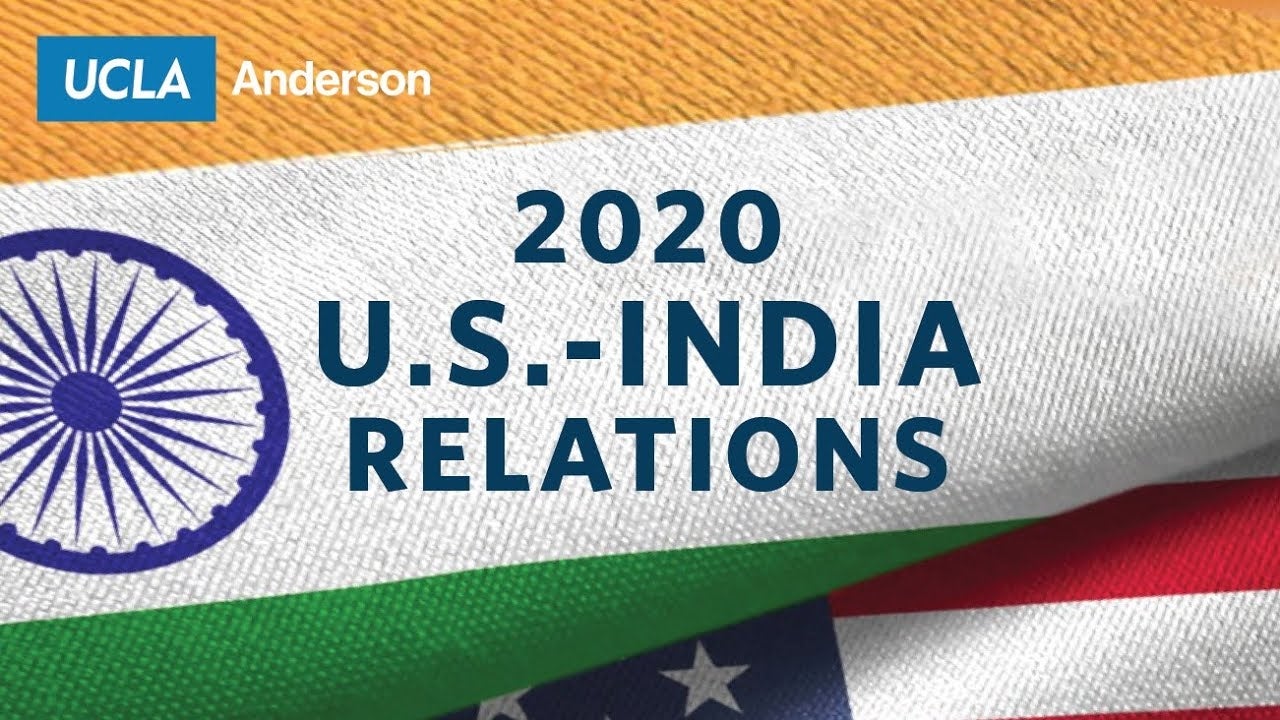
U.S.-India Relations
November 16, 2020
The U.S.-India relationship is vital to security and stability in the world and is founded on a shared commitment to freedom, democratic principles, and the rule of law. The strong people-to-people ties between the countries, reflected in a strong Indian American diaspora, have been a tremendous source of strength for the partnership. U.S.-Indian relations have recently benefited from close ties between Prime Minister Modi and President Trump, following a 20-year effort to improve relations that has survived many political transitions in both countries. The past two decades have seen a surge in bilateral trade and a growing convergence of strategic interests, and in recent years a series of military co-operation deals. On many transnational issues, including cybersecurity, freedom of navigation in the Indian Ocean, and climate change - New Delhi and Washington are natural partners linked by common interests and values. Growing antagonism between China and the West also favors closer links between India and the US. Taken together, this should provide confidence for the future of the relationship. Will economic retrenchment and economic headwinds due to the COVID pandemic dampen US-India ties, or will these flourish as China’s global ambitions become subject to greater pushback?
The Center for Global Management and Indian School of Business (ISB) hosted a discussion on U.S.-India relations that addressed these questions and more. Arvind Singhal (’82), president of the UCLA Anderson Alumni Chapter in India and chairman of Technopak Advisors moderated a fascinating and broad reaching discussion with Shyam Saran, 26th foreign secretary of India; Keshav Murugesh, group CEO of WNS Global Services, a NYSE listed company in the BPM business headquartered in Mumbai; and Romain Wacziarg, professor of economics and Hans Hufschmid Chair in Management who teaches the CGM’s business environment of India global immersion courses. Bhagwan Chowdhry, professor of finance at ISB and research professor at UCLA Anderson provided opening remarks. Singhal set the context for the 90-minute conversation by addressing three historical phases of the relationship: pre-1947; post India’s independence and pre-reforms in India; and post-Cold War. He contextualized the relationship through different prisms. Panelists then explored the strategic relations, macro linkages of trade and financial flows as well as the business and societal linkages between the world’s two largest democracies. The global audience of students, alumni, faculty, staff, and members of the extended UCLA and ISB communities and general public asked many interesting questions during the audience Q&A that went into a deeper discussion on some of the key topics raised and addressed the Regional Comprehensive Economic Partnership (RECP), arguably the largest free trade agreement in history that was recently signed by 15 countries. India was to be a member of the RCEP but withdrew. During open discussion among the panelists, they also addressed what opportunities exist to expand the U.S.-India partnership in support of mutual interests during these challenging times with the hope that India and the United States will someday attain the relationship they deserve. Panelists reached an optimistic consensus on the bright future of U.S.-India relations. The discussion which was part of the CGM’s World Today Discussion Series was in partnership with The Global ISB Forum (TGIF), supported by the ISB-EY Initiative for Emerging Markets. The World Today Discussion Series engages students in dialogue in an interactive, engaging and enriching discussion format around current global issues that transcend borders. Through the series, the CGM engages globally minded students with issues that matter and ideas that stimulate. Through balanced discourse, the series serves as a neutral forum to educate students on global issues while at the same time encourage debate and examination. UCLA Anderson’s Center for Global Management is committed to providing timely and relevant information about critical global topics and issues that matter to our community and the world.
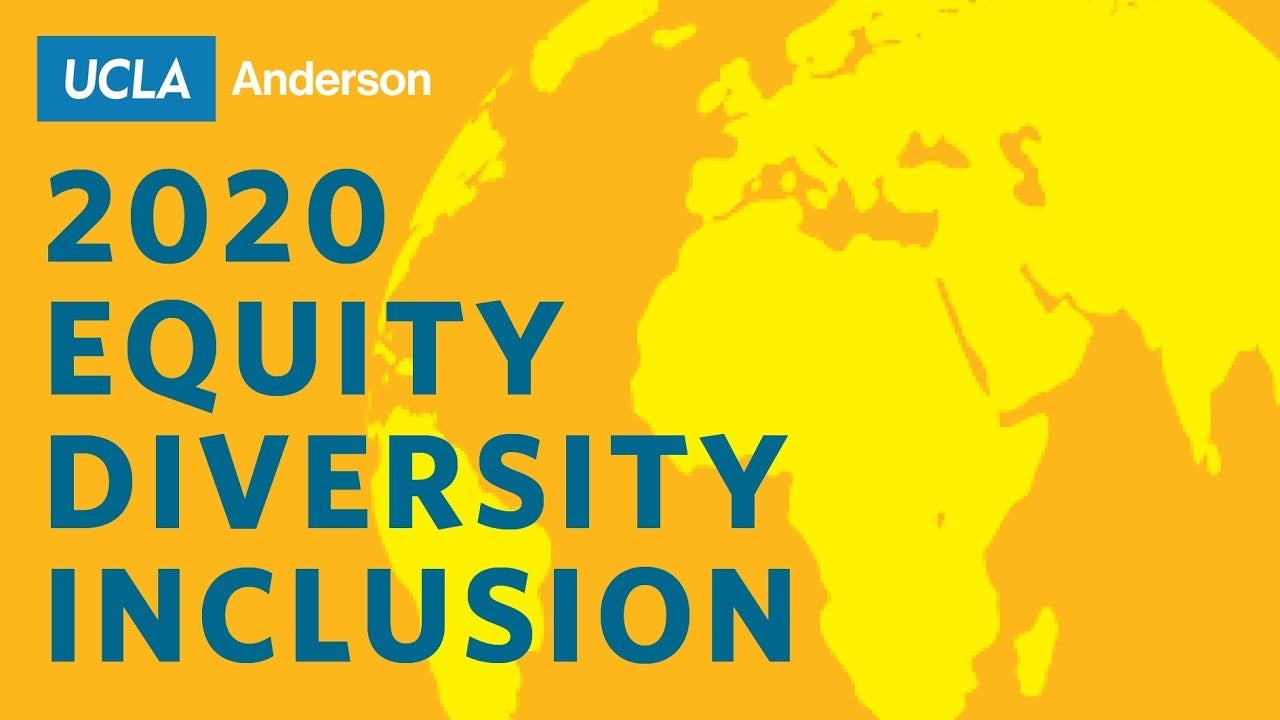
Equity, Diversity and Inclusion in the Workplace Around the Globe
November 12, 2020
The events of 2020, including the COVID-19 pandemic and social unrest have turned workplaces upside down and are changing and shaping the world we live in. Amid the pandemic, many employees are struggling to do their jobs now that the boundaries between work and home have blurred. Challenges that women already faced have been intensified. There has also been a shift in the global understanding of diversity, equity and inclusion. Diversity spans many dimensions – both visible and invisible identities – and our descriptions and approaches must be intersectional. Workers also want equitable and inclusive environments that are safe and welcome a variety of voices. The choices companies must make now are critical and urgent, and could shape the workplace for decades to come.
The Center for Global Management hosted a moderated conversation with leaders from across Europe, Latin America and the United States. Not only have these women tackled leadership challenges, they have done so in sectors not particularly known for diversity—namely finance, technology and education. The conversation was moderated by Professor Sebastian Edwards. Panelists included: UCLA alumna Marilou Calara (B.S. ’86), chief operating officer of EMEA Investments, Citi Private Bank who has been with Citi for almost twenty years since receiving her MBA from Berkeley and originally considering a career in the foreign service; U.S.-based Katrina Jones, diversity and inclusion lead for Amazon Web Services ProServe who has served as a D&I lead at large, complex global companies and startups and now oversees thousands of employees at AWS; and Chile-based Manola Sanchez, former dean, Universidad Adolfo Ibanez, who spent time at McKinsey and Goldman Sachs and was the first Chilean woman to obtain an MBA from Harvard Business School. Drawing on professional and personal experiences, panelists shared stories and unique perspectives from their own careers. They addressed challenges faced along the way and provided insights on equity, diversity and inclusion in their respective countries and regions as well as across global workforces. They highlighted the power of unfamiliar perspectives and experiences and showed how international and domestic diversity go hand in hand. The discussion underscored how this moment in time requires long-term thinking, creativity, strong leadership, and a laser focus on the value of diversity and inclusion in the workplace. The global audience of students, alumni, faculty, staff, and members of the extended UCLA community and general public asked many interesting questions during the audience Q&A that went into a deeper discussion on some of the key topics raised. The discussion which was part of the CGM’s World Today Discussion Series was also proudly featured as an Embracing Diversity Series event, and as a lead up to UCLA Anderson’s Embracing Diversity Week and UCLA’s International Education Week. The World Today Discussion Series engages students in dialogue in an interactive, engaging and enriching discussion format around current global issues that transcend borders. Through the series, the CGM engages globally minded students with issues that matter and ideas that stimulate. Through balanced discourse, the series serves as a neutral forum to educate students on global issues while at the same time encourage debate and examination. UCLA Anderson’s Center for Global Management is committed to providing timely and relevant information about critical global topics and issues that matter to our community and the world.
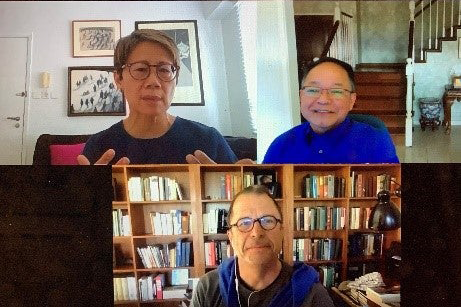
The U.S.-China Divorce: A Discussion on Why Rather than Decouple the United States and China Must Find Ways to Coexist
July 20, 2020
Economically, the United States and China have been coupling up for decades and became the world’s biggest trading partners in 2014. Their economies are highly intertwined. But now, amid trade and technology wars, a global pandemic and strained diplomatic relations, judging from the White House’s recent actions, it wants to decouple the U.S. from China – economically, technologically, geopolitically and financially. However, the connections between these giant markets took decades to build and breaking up may be hard to do. A divorce will likely involve deep and wide collateral damage, affecting U.S. corporate interests with long-term ambitions in a country with advantages that are likely to sustain its position as the world’s main factory -- mature supply chains, a massive market, well-built infrastructure and skilled labor. A seismic decoupling will also negatively affect the economies of many other countries. The U.S. will need a plan.
The Center for Global Management hosted a moderated conversation with Chris Tang, distinguished professor and Edward W. Carter Chair in Business Administration and a highly respected authority on global supply chains and Christine Loh, UCLA Anderson visiting professor and former minister in the Hong Kong SAR Government. Tang and Loh discussed why a decoupling after 40 years of mutually beneficial relations is a lose-lose situation. They explored steps that need to be considered, including a rethinking of the global supply chain, and discussed issues of trade, finance and technology as part of global shifts as a result of the decoupling and the COVID-19 pandemic. Do U.S. businesses support the U.S. strategy? Could a new era of Sino-U.S. relations be built on cooperation, starting with joint development of a COVID-19 vaccine? Could there be a mutually beneficial 5G “coopetition” that involves not only Chinese and U.S. companies, but also firms from other countries? Loh and Tang addressed many questions and analyzed why rather than a decoupling, China and the U.S. must find ways to coexist and overcome their differences, build mutual trust, and work constructively to uphold a stable and peaceful international order. The conversation was moderated by Professor Sebastian Edwards, faculty director of the CGM. The global audience which comprised over 200 enrolled and admitted students as well as alumni, faculty, staff, members of the extended UCLA community and general public asked many interesting questions during the audience Q&A that went into a deeper discussion on some of the key topics raised, including what a Biden administration could mean for the relationship between the world’s two superpowers. The World Today Discussion Series engages students in dialogue in an interactive, engaging and enriching discussion format around current global issues that transcend borders. Through the series, the CGM engages globally minded students with issues that matter and ideas that stimulate. Through balanced discourse, the series serves as a neutral forum to educate students on global issues while at the same time encourage debate and examination. UCLA Anderson’s Center for Global Management is committed to providing timely and relevant information about critical global topics and issues that matter to our community and the world.
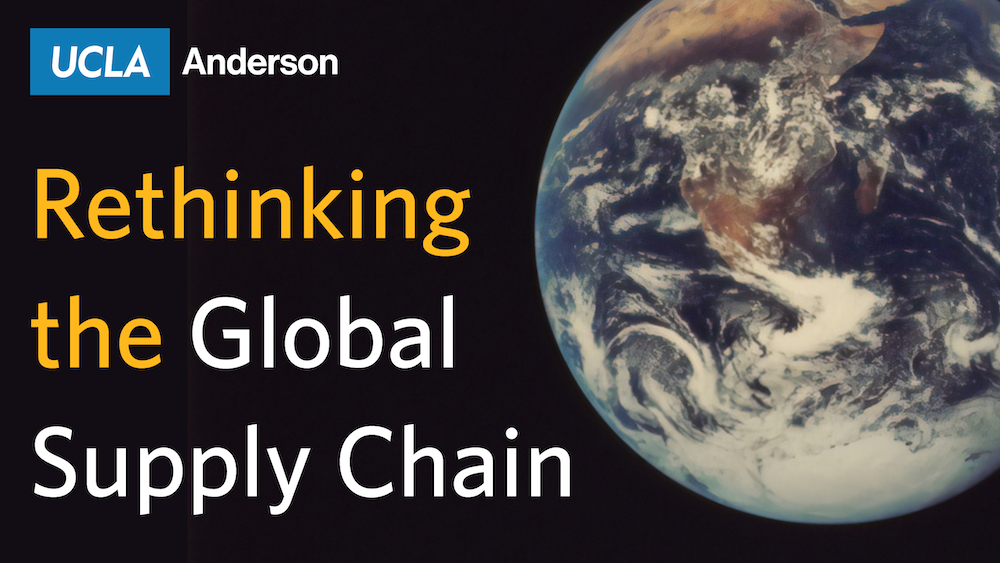
A Rethink on the Global Supply Chain in the Midst of the COVID-19 Pandemic
May 11, 2020
As a nation of plenty, Americans are in shock when state governors are pleading the federal government for a greater allocation of emergency stockpiles, and medical professionals are appealing for donations of personal protective equipment (PPE) such as face masks and gloves. While the COVID-19 pandemic has exposed the world’s risky dependence on vulnerable nodes in global supply chains, it has also cast a spotlight on companies that already have flexible production lines. Nimble luxury goods manufacturers in Europe overhauled operations and turned their supply chains to masks and gowns; LVMH’s perfume factories were producing hand sanitizer; and makers of cars and planes started to assemble ventilators and other equipment. Flexible supply chains have played a critical role, including rapid raw material sourcing, product design, development and testing, and distribution. The Center for Global Management (CGM) hosted its sixth virtual discussion in its Special COVID-19 World Today Discussion Series with Chris Tang, distinguished professor and Edward W. Carter Chair in Business Administration and a highly respected authority on global supply chains. Tang explored the root causes to the shortage of PPE in the United States and addressed the current response. He also examined what we can learn from the current crisis and explored whether COVID-19 will be the catalyst that forces many companies, and entire industries, to rethink their global supply chain strategy and manage it in a more resilient manner. Tang also shared his longer term view on whether post COVID-19 local resilience will be prized over global efficiency. Following an extremely engaging and thought-provoking presentation with numerous timely and relevant global examples, Tang continued the conversation with Professor Sebastian Edwards and answered many thoughtful and pertinent questions from an engaged audience which comprised over 500 students, alumni, faculty, staff and members of the extended UCLA and global community. He addressed reshoring and supply chain financing and shared some key ideas for managing supply chain risk including innovations in advanced robotics, 3D printing and blockchain; the role of government and regulations for mission critical products; and the importance of supply chain transparency and identifying, accessing and mitigating supply chain risks. Tang has conducted research on global supply chain for over 30 years and has co-written a book on “Supply Chain Risk Management” and published over 100 articles on this subject. The CGM’s Special COVID-19 World Today Discussion Series aims to engage the community in interactive dialogue around implications of the COVID-19 global pandemic that transcends borders. In this Series, through Zoom presentations and discussions open to the UCLA Anderson community: UCLA and Anderson faculty, alumni, board members and thought leaders share their perspectives on the critical business, policy and socioeconomic issues that affect us all. These are unprecedented times. UCLA Anderson’s Center for Global Management is committed to providing timely and relevant information about critical global topics and issues that matter to our community and the world.
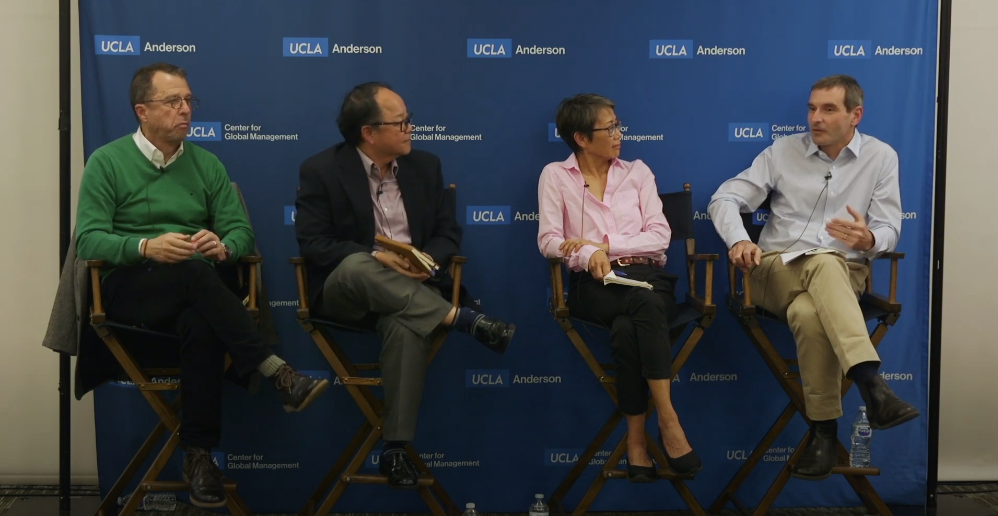
2020 Protests Around the World: Making Sense of the Turmoil—Socioeconomic and Business Perspectives
January 29, 2020
In 2019, demonstrations around the globe, both peaceful and violent were set off by social unrest over economic instability, government corruption and inequality. The protests created a domino effect, crossing borders and bringing crowds of people to streets globally to demand change. In Great Britain, mass demonstrations took place both for and against Brexit, destined to define the country’s future; in France, a year into the yellow vest protests, while demonstrations waned in size, grievances remain; in Chile, anger at increases in public transport costs grew into a broad-based movement protesting inequality; in Lebanon, a levy on WhatsApp calls sparked pent-up anger, forcing Prime Minister Saad Hariri to resign in October; and in Hong Kong, a June rally against a law allowing extradition to China morphed into a broad anti-China movement. The desire to be heard was felt by people from different nationalities, religions and political affiliations. The UCLA Anderson Center for Global Management hosted a discussion over dinner with Christine Loh, visiting professor and former Government minister, Hong Kong S.A.R. Government; Chris Tang, Edward W. Carter Chair In Business Administration; and Romain Wacziarg, Hans Hufschmid Chair in Management who addressed the global landscape and explored the worldwide push for action from a socio-economic and business perspective. While there is little certainty on what will happen going forward, they also shared their longer term views and the possible wider implications for business and society that could evolve as citizens across the globe continue to protest injustices, demand reforms and push for change. They also addressed the role of government. The discussion was moderated by Sebastian Edwards, Henry Ford II Chair in International Management. The packed room included faculty and students from the UCLA Anderson and its full-time, fully employed and executive MBA as well as Ph.D. programs. Students from the UCLA School of Law and UCLA Luskin School of Public Affairs were also invited to attend. The World Today Discussion Series engages students in dialogue in an interactive, engaging and enriching discussion format around current global issues that transcend borders. Through the series, the CGM engages globally minded students with issues that matter and ideas that stimulate. Through balanced discourse, the series serves as a neutral forum to educate students on global issues while at the same time encourage debate and examination.
